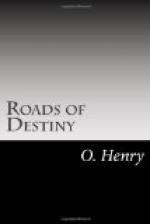“Coward,” cried the lord of Beaupertuys, “cease chattering your teeth long enough to give the word for us, if you can.”
Mine host’s knees smote the floor. He was without a vocabulary. Even sounds were beyond him. Still, by gestures he seemed to beseech peace in the name of his house and custom.
“I will give the word,” said the lady, in a clear voice. She went up to David and kissed him sweetly. Her eyes were sparkling bright, and colour had come to her cheek. She stood against the wall, and the two men levelled their pistols for her count.
“Un—deux—trois!”
The two reports came so nearly together that the candles flickered but once. The marquis stood, smiling, the fingers of his left hand resting, outspread, upon the end of the table. David remained erect, and turned his head very slowly, searching for his wife with his eyes. Then, as a garment falls from where it is hung, he sank, crumpled, upon the floor.
With a little cry of terror and despair, the widowed maid ran and stooped above him. She found his wound, and then looked up with her old look of pale melancholy. “Through his heart,” she whispered. “Oh, his heart!”
“Come,” boomed the great voice of the marquis, “out with you to the carriage! Daybreak shall not find you on my hands. Wed you shall be again, and to a living husband, this night. The next we come upon, my lady, highwayman or peasant. If the road yields no other, then the churl that opens my gates. Out with you into the carriage!”
The marquis, implacable and huge, the lady wrapped again in the mystery of her cloak, the postilion bearing the weapons—all moved out to the waiting carriage. The sound of its ponderous wheels rolling away echoed through the slumbering village. In the hall of the Silver Flagon the distracted landlord wrung his hands above the slain poet’s body, while the flames of the four and twenty candles danced and flickered on the table.
THE RIGHT BRANCH
Three leagues, then, the road ran, and turned into a puzzle. It joined with another and a larger road at right angles. David stood, uncertain, for a while, and then took the road to the right.
Whither it led he knew not, but he was resolved to leave Vernoy far behind that night. He travelled a league and then passed a large chateau which showed testimony of recent entertainment. Lights shone from every window; from the great stone gateway ran a tracery of wheel tracks drawn in the dust by the vehicles of the guests.
Three leagues farther and David was weary. He rested and slept for a while on a bed of pine boughs at the roadside. Then up and on again along the unknown way.
Thus for five days he travelled the great road, sleeping upon Nature’s balsamic beds or in peasants’ ricks, eating of their black, hospitable bread, drinking from streams or the willing cup of the goatherd.




